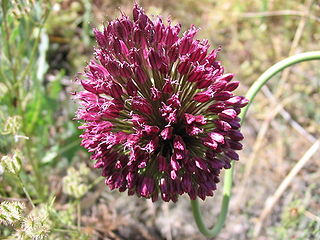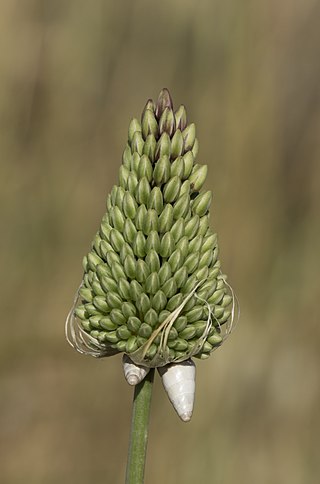
Chives, scientific name Allium schoenoprasum, is a species of flowering plant in the family Amaryllidaceae that produces edible leaves and flowers. Their close relatives include the common onions, garlic, shallot, leek, scallion, and Chinese onion.

Allium ursinum, known as wild garlic, ramsons, cowleekes, cows's leek, cowleek, buckrams, broad-leaved garlic, wood garlic, bear leek, Eurasian wild garlic or bear's garlic, is a bulbous perennial flowering plant in the amaryllis family Amaryllidaceae. It is native to Europe and Asia, where it grows in moist woodland. It is a wild relative of onion and garlic, all belonging to the same genus, Allium. There are two recognized subspecies: A. ursinum subsp. ursinum and A. ursinum subsp. ucrainicum.

Allium oleraceum, the field garlic, is a Eurasian species of wild onion. It is a bulbous perennial that grows wild in dry places, reaching 30 centimetres (12 in) in height. It reproduces by seed, bulbs and by the production of small bulblets in the flower head. Unlike A. vineale, it is very rare with A. oleraceum to find flower-heads containing bulbils only. In addition, the spathe in A. oleraceum is in two parts.

Allium sphaerocephalon is a plant species in the Amaryllis family known as round-headed leek, round-headed garlic, ball-head onion, and other variations on these names. Drumstick allium is another common name applied to this species. Some publications use the alternate spelling Allium sphaerocephalum. It is a bulbous herbaceous perennial plant.

Allium roseum, commonly called rosy garlic, is an edible, Old World species of wild garlic. It is native to the Mediterranean region and nearby areas, with a natural range extending from Portugal and Morocco to Turkey and the Palestine region. It is cultivated widely, and has become naturalised in scattered locations in other regions outside its natural range.
Allium delicatulum is a Eurasian species of onion native to European Russia, Western Siberia, Xinjiang, and Kazakhstan. It grows in open grasslands and deserts.

Allium carinatum, the keeled garlic or witch's garlic, is a bulbous perennial flowering plant in the family Amaryllidaceae. It is widespread across central and southern Europe, with some populations in Asiatic Turkey. It is cultivated in many places as an ornamental and also for its potently aromatic bulbs used as a food flavoring.

Allium chamaemoly, called dwarf garlic, is a species of garlic native to the Mediterranean region and cultivated elsewhere for its pretty flowers and potently aromatic bulbs. It is found in the wild in Spain, France, Malta, Italy, Greece, the Balkans, Algeria, and Morocco.
Allium decipiens is a Eurasian species of garlic in the amaryllis family native to eastern Europe and western Asia.

Allium ericetorum is a species of Allium widespread across much of southern and central Europe, from Portugal to Ukraine.

Allium flavum, the small yellow onion or yellow-flowered garlic, is a species of flowering plant in the genus Allium. A bulbous herbaceous perennial, it is native to the lands surrounding the Mediterranean, Black, and Caspian Seas, from France + Morocco to Iran + Kazakhstan.
Allium hirtovaginatum is a species of wild onion native to the Mediterranean region, from Morocco and the Balearic Islands to Turkey.
Allium lehmannii is a plant species endemic to southern Italy. It is found only the Island of Sicily in the Mediterranean and in the nearby Calabria region of the Italian mainland.

Allium pallens is a species of wild onion native to the Mediterranean region and Middle East from Portugal and Algeria to Iran.

Allium subvillosum, the Spring Garlic, is a European and North African species of wild onion native to southern Iberia, the Balearic Islands, Sicily, northern Africa and the Azores where it might be introduced.

Allium curtum is species of flowering plant in the amaryllis family, Amaryllidaceae. It is native to Cyprus, Egypt, Lebanon, Palestine, the Sinai Peninsula, Syria and Turkey. It is a bulb-forming perennial producing a tight, head-like umbel of green or purple flowers.

Allium tel-avivense is a plant species found in Israel, Palestine, Jordan and Egypt, including the Sinai Peninsula. It is a bulb-forming perennial with a small umbel of only a few flowers. Tepals are pink, and the ovary is large, green and conspicuous. Its name comes from the city of Tel Aviv.
Allium filidens is a species of onion found at high elevations of central and south-central Asia. It is a bulb-forming perennial up to 45 cm tall, forming a hemispherical umbel of flowers; tepals white or pink with a purple midvein.

Allium subhirsutum, the hairy garlic, is a plant species widespread around the Mediterranean region from Spain and the Canary Islands to Turkey and Palestine.
Allium melitense is a species of wild leek endemic to the Maltese archipelago. The species was first described as a variety of Allium ampeloprasum by Stefano Sommier and Alfredo Caruana Gatto in their Maltese flora published in 1915, while emphasizing its observable differences with A. ampeloprasum and the need for further study. The taxon was then elevated to species by Raffaele Ciferri and Valerio Giacomini, and again by Mifsud & Mifsud in 2018.















